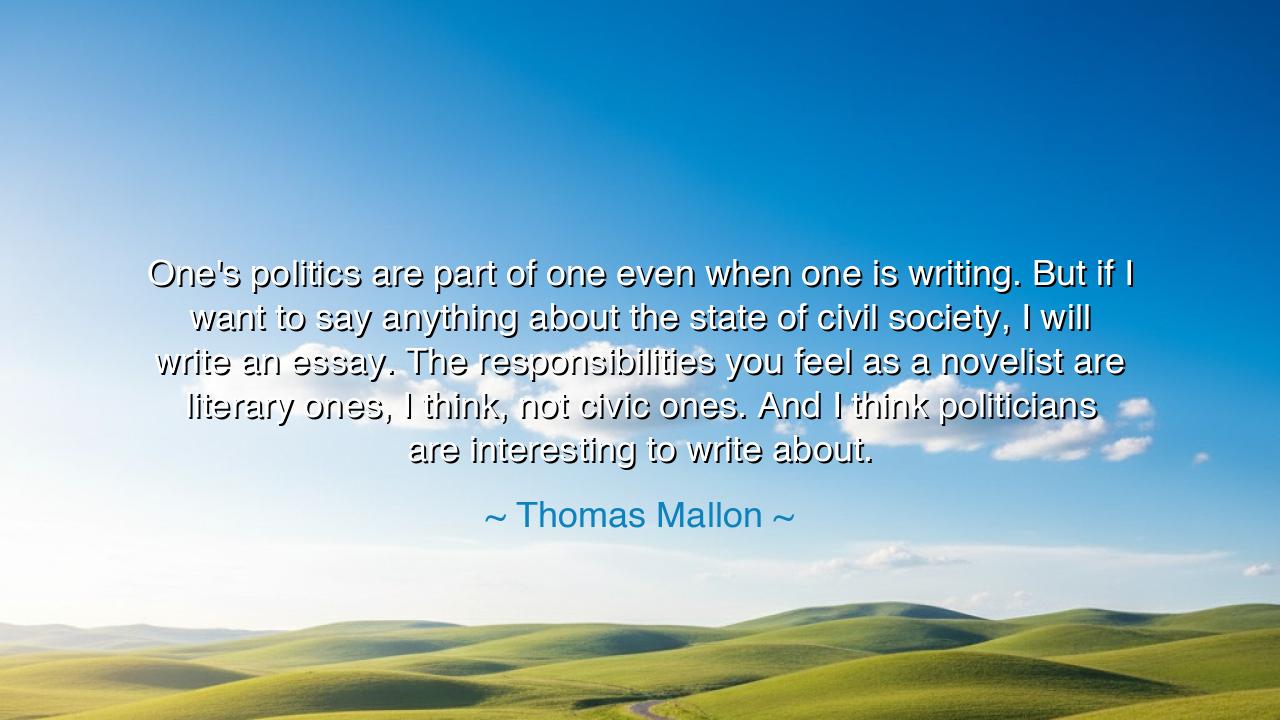
One's politics are part of one even when one is writing. But if I
One's politics are part of one even when one is writing. But if I want to say anything about the state of civil society, I will write an essay. The responsibilities you feel as a novelist are literary ones, I think, not civic ones. And I think politicians are interesting to write about.






Hear the reflective wisdom of Thomas Mallon, who declared: “One's politics are part of one even when one is writing. But if I want to say anything about the state of civil society, I will write an essay. The responsibilities you feel as a novelist are literary ones, I think, not civic ones. And I think politicians are interesting to write about.” In these words we glimpse the eternal tension between art and politics, between the writer as citizen and the writer as creator. Mallon confesses that a writer’s politics will inevitably leave their trace in the work, as the breath leaves its imprint upon glass. Yet he draws a sacred line: that the responsibility of the novelist is first to literature, to truth of character and story, not to the slogans of the state.
The origin of this thought is rooted in Mallon’s own life as both essayist and novelist. In his essays, he addresses the condition of civil society directly, with the tools of reason and argument. In his novels, he explores the lives of politicians, not to glorify or condemn them, but to understand them as human beings—driven by ambition, frailty, and hope. His words remind us that while politics may enter literature, literature must not be reduced to politics. The novelist owes allegiance not to parties or programs, but to truth, imagination, and beauty.
The ancients, too, wrestled with this question. Plato, suspicious of poets, feared that their art corrupted civic life, while Aristotle saw poetry as a higher truth than history, speaking to universal patterns rather than fleeting events. In these debates we see Mallon’s distinction: the essay belongs to the civic realm, bound to argument and persuasion; the novel belongs to the literary realm, bound to vision and art. Both touch upon politics, yet their responsibilities diverge.
History offers us examples of this balance—and of its violation. Consider George Orwell, who wrote both political essays and novels. In his essays, he spoke directly of tyranny, truth, and freedom. In his novels—Animal Farm and 1984—his politics were present, yes, but they were carried upon the wings of story, character, and allegory. Orwell did not abandon literature to civic duty; he transformed politics into art. Contrast this with works of pure propaganda, where literature is suffocated by ideology, and one sees why Mallon insists that the responsibilities of the novelist are literary ones.
The meaning of Mallon’s words is therefore profound: that a novelist must honor the integrity of literature itself. Civil society may demand commentary, and the writer may offer it—but in another form, the essay, where argument is rightful. In fiction, however, the task is different. The novelist’s duty is to reveal the human condition in all its complexity, and if politics appears, it must do so as lived experience, not as sermon. To confuse these duties is to weaken both the essay and the novel, leaving neither honest nor effective.
What lesson shall we take from this? That in our lives we must respect the boundaries of roles and responsibilities. Speak plainly when plain speech is needed; craft artfully when art is called for. Do not use literature as a blunt instrument, nor essays as veiled fictions. Let each tool be used in its rightful way, and the truth will shine brighter. And remember that while politicians may inspire fascination, they are best understood not only as wielders of power but as characters in the human drama, subject to the same frailties as all.
Therefore, children of the future, engrave this wisdom upon your hearts: art and politics are threads woven through the same cloth, yet each thread must hold its own integrity. When you write, let your politics whisper in the background, but let your duty to truth, beauty, and imagination be foremost. When you reason about society, write with clarity and argument. And above all, remember that the world does not only need the cries of politicians or the schemes of parties—it needs stories that reveal the soul, and essays that illuminate the path toward justice. In the balance of both lies the fullness of human expression.






AAdministratorAdministrator
Welcome, honored guests. Please leave a comment, we will respond soon